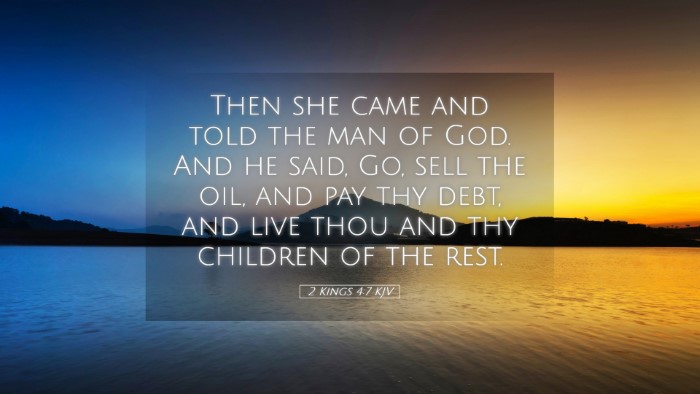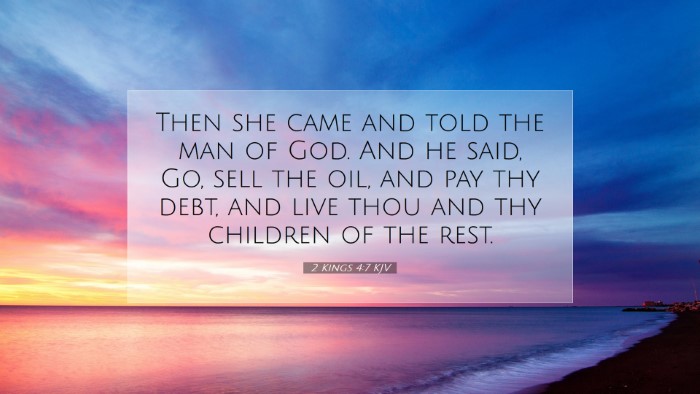Commentary on 2 Kings 4:7
Verse: 2 Kings 4:7 - "Then she came and told the man of God. And he said, Go, sell the oil, and pay thy debt, and live thou and thy children of the rest."
Introduction
2 Kings 4:7 narrates a pivotal moment in the life of a widow who had been deeply burdened by her financial obligations after her husband's death. This verse encapsulates the wider themes of divine provision, human action, and the faithfulness of God in times of need. Various public domain commentaries provide rich insights into the verse, highlighting the significance of the widow's encounter with Elisha, the lessons on faith and stewardship, and the broader theological implications of God's miraculous workings.
Contextual Analysis
The account leading up to this verse features the widow, who cries out to the prophet Elisha for help. Her desperation stems from her inability to pay her debts, which puts her sons at risk of being taken as servants. This context is critical, as it sets a foundation for understanding God's compassionate intervention through the prophet.
The Role of Elisha
Elisha, as a servant of God, acts as a mediator between the Lord's provision and the widow's need. Matthew Henry emphasizes that Elisha’s response reflects the nature of prophetic ministry: to bring divine assistance into dire human circumstances. The miracle of multiplying the widow's oil serves as both a testament to God's power and an illustration of His concern for the marginalized.
The Widow's Faith
Albert Barnes comments on the significance of the widow's faith and obedience. Despite her bleak situation, she acts on the instructions of Elisha, demonstrating trust in God’s provision. This act of faith is essential, as it highlights the conditional nature of divine miracles which often requires a human response. The widow’s willingness to participate in the process of miracles reveals the interplay of faith and works in the believer's life.
Thematic Insights
- Divine Provision: The narrative illustrates God’s ability to provide in extraordinary ways. Adam Clarke points out that the oil’s multiplication signifies not only physical sustenance but also spiritual nourishment — a reminder that God can fill our emptiness.
- Faith and Obedience: Elisha instructs the widow to gather vessels, a command requiring faith. Henry notes that this action parallels the believer's need to prepare for God’s blessings by emptying oneself and making room for divine intervention.
- Stewardship: After the miraculous provision, the widow is instructed to sell the oil and pay her debts, illustrating the importance of responsible stewardship. Barnes indicates that miraculous provision is intertwined with human responsibility, reinforcing ethical considerations in the management of resources.
Theological Implications
This passage presents several theological themes crucial for understanding God's character:
- God’s Care for the Vulnerable: The widow represents the vulnerable in society, and God's direct engagement with her underscores His love and care for those in distress.
- Miracles and Their Purpose: The miracle is not an end in itself, but it points to God's providential care, encouraging believers to seek Him in times of need.
- Hope in Despair: The story delivers a powerful message about hope and deliverance, serving as a reminder that, like the widow, believers can trust that God sees their struggles and will provide a way through.
Practical Applications
The lessons from 2 Kings 4:7 extend beyond theological reflection, offering practical guidance for ministry and daily living:
- Encouraging Faith: Pastors and leaders can use this narrative to inspire congregants, encouraging them to bring their needs before God, trusting in His provision.
- Responsibility of Stewardship: The emphasis on paying debts serves as a call to ethical financial practices, reminding believers to manage their resources in a way that honors God.
- Caring for the Vulnerable: This passage challenges communities to actively support those in financial distress, echoing God’s heart for the poor and marginalized.
Conclusion
2 Kings 4:7 offers profound insights into God's character, the nature of faith, and the believer's response to divine provision. The combined insights from Matthew Henry, Albert Barnes, and Adam Clarke provide a comprehensive understanding of this passage. Through the lens of this narrative, pastors, students, theologians, and scholars alike are encouraged to reflect on God’s faithfulness and their role in expressing His care to others.


